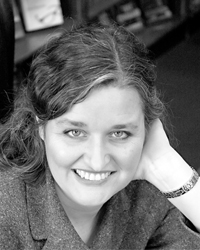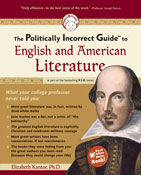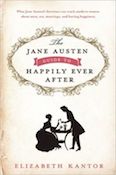The Politically Incorrect Guide™ to English and American Literature
Exclusive hardcover edition — not available in stores!
The study of literature is essential to preserving Western culture and transmitting it to future generations. Yet today’s English departments have come under the control of people who teach anything but the English and American literary classics. Even when the subject is Shakespeare or Faulkner, the professor’s own politics — Marxism, feminism, or some similar radical agenda — will be the real content of the course. Meanwhile, today’s politically correct professors are busy replacing the “dead white males” of the traditional literary canon with the authors of 1980s bestsellers that hit all the politically correct themes.
The result? Most of us are missing out on the many things worth learning from great literature. The solution? This handy guide, which teaches you what every well-educated American should know about our literary heritage — but through no fault of his own, probably doesn’t.
In “The Politically Incorrect Guide™ to English and American Literature,” Elizabeth Kantor, Ph.D.:
- introduces you to the great stories, the delightful plays, the powerful poems that constitute the traditional “canon” of English literary classics;
- gives you the tools (formerly taught in English departments, now neglected by PC professors) that you need to enjoy this literature more intensely — and to learn from it in a way you can’t learn from anything else;
- empowers you to see through every variety of politically correct “literary theory,” such as “deconstruction”;
- explains the real purpose of studying English and American literature;
- and demonstrates the necessity of literary study for the transmission of Western culture to the next generation.
Lists at the beginning of each chapter include the literature discussed as well as other works that together add up to a curriculum for a complete self-taught survey of English and American literature. Whether you’re currently in college, or just someone who wasn’t really taught English literature and wishes he had been, the literary works, themes, and modes of analysis treated in this Guide will give you a solid start in discovering the infinite variety of wonderful literature written in our language — and the life-changing lessons you can take from it.
What PC English professors don’t want you to learn from . . .
Beowulf: Heroes deserve our respect and gratitude. If we don’t admire them, there’s something wrong with us
Medieval English literature: The wisdom of the past beats the latest expert opinion, hands down
Chaucer: Chivalry is one of the great inventions of Western culture, and it’s contributed enormously to women’s happiness
Christopher Marlowe: Being “transgressive” will take you only so far — in art, and in life
Shakespeare’s tragedies: Some choices are inherently destructive (it’s just built into the nature of things)
Shakespeare’s comedies: Our human nature — including even the very limitations that define it — is a rich source of happiness
Shakespeare’s Sonnets: Love and sex are serious things. If you treat them lightly, someone’s going to get hurt
Milton: Our intellectual freedoms are Christian, not anti-Christian, in origin
English literature of the Enlightenment: Realism, common sense, and good humor are more dignified equipment for life than victim politics, wishful thinking, and liberal guilt
The Romantic poets: Intelligent radicals become conservatives when they grow up — make that, if they grow up
Wordsworth and Coleridge: The difference between entertainment that degrades and entertainment that refreshes and ennobles
Byron and Shelley: The human mind has enormous creative powers — which, if abused, can be terribly destructive
Jane Austen: Social conventions exist for our (mainly women’s) protection — and most men would be improved if they were more patriarchal than they actually are
Dickens: Reformers can do more harm than the injustices they set out to reform. And charity begins at home
Avant-garde and modernist literature: Christianity trumps the edgy art world
Evelyn Waugh: Without religion, human beings are disgustingly selfish and shallow — and in abandoning Christianity, our culture will shrivel and die
T. S. Eliot: Tradition is necessary to culture
Hawthorne, Melville, Poe, and Twain: Evil isn’t “back there” or “out there”; it’s in the human heart
William Faulkner (and Southern literature in general): Civilization is valuable. A fatally flawed culture beats no culture at all
Flannery O’Connor: Even modern American liberals aren’t immune to original sin
“What all these lessons have in common,” writes Dr. Kantor, “is that it’s hard to imagine politically correct English professors’ being pleased that their students might learn them. . . . . The one lesson that you can’t learn from great English and American literature is the politically correct point of view: the idea that the culture of the West is nothing but a source of injustice, and that only perpetual vigilance against all its ‘isms’ and ‘phobias’ can protect us against the return of oppression and misery.”
“A refreshing antidote to the academic brew that has defaced our literature and diminished our culture.” — David Horowitz, bestselling author of “The Professors” and founder of the David Horowitz Freedom Center
“This guide to literature is truly offensive – in the best sense of the word. It goes on the attack; it pulls no punches; and it takes no prisoners. It shows that great literature conveys great truths, and that literature like truth is timeless in its applicability. As such, all genuine lovers of literature will salute this great and gritty guide.” — JOSEPH PEARCE, Writer in Residence and Professor of Literature, Ave Maria University, and author of many literary biographies, including “The Unmasking of Oscar Wilde” and “Tolkien: Man and Myth”
“Elizabeth Kantor’s robust and refreshingly honest survey will remind scholars and students alike of what everyone should know (but what most students have a hard time knowing thanks to edited-down curricula and censorious professors).” — Kevin Cope, professor of English, Louisiana State University
“This marvelous book is part demolition job, part reconstruction effort. Kantor takes readers on an entertaining (if also horrifying) tour of the politically correct menagerie now in charge of literature departments across the country. The result is a wise and sobering book that is required reading for anyone who cares about the future of the humanities.” — Roger Kimball, co-editor and publisher, The New Criterion
Click here to read Elizabeth Kantor on why literature is a conservative issue.
Tags: Elizabeth Kantor, The Politically Incorrect Guide to English and American Literature
- The Author

Elizabeth Kantor
Elizabeth Kantor is author of The Politically Incorrect Guide™ to English and American Literature and an editor for Regnery Publishing. […] More about Elizabeth Kantor.
- Books by the Author
Ratings Details














